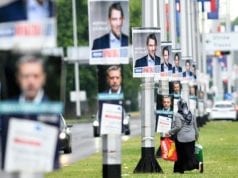
 President said there were people ‘on both sides’ of the case and that ‘they admitted their guilt’Donald Trump in Washington DC, on 18 June. Photograph: Alex Wong/Getty ImagesDonald Trump has again suggested that the wrongfully convicted teenagers in the Central Park Five case are guilty, and has declined to apologise for taking out print ads in 1989 that called for their execution.The case has been thrust into the limelight again with the release of Oscar-nominated director Ava DuVernay’s Netflix series When They See Us, a fictionalised re-examination of the affair that gripped New York in the late 1980s.Before any of the five teenagers, all black or Hispanic, had been tried over the brutal rape of a white woman in Central Park, Trump, then a Manhattan real-estate tycoon, took out full-page newspaper ads calling for the death penalty to be reinstated in New York state.Those involved in the case later said Trump’s ads had a significant impact on the trial and contributed to the wrongful conviction.The prosecution relied heavily on videotaped confessions, which defence lawyers argued were coerced.In 2002, after the boys had spent years in prison, a serial rapist named Matias Reyes confessed to the attack. His DNA linked him to the crime scene. The convictions against the five were vacated and the city settled a multimillion-dollar lawsuit.On Tuesday, as Trump headed to Orlando to launch his campaign for re-election, he was asked by reporters if he would apologise for his role in the saga.The president responded: “Why do you bring that question up now? It’s an interesting time to bring it up. You have people on both sides of that. They admitted their guilt. If you look at Linda Fairstein, and you look at some of the prosecutors, they think that the city should never have settled that case. So, we’ll leave it at that.”Trump’s insistence despite evidence that the five were not guilty was a feature of the 2016 election.Since DuVernay’s series was released, a number of officials involved in the prosecution have suffered significant backlash.Fairstein, the New York prosecutor turned novelist who was referenced by Trump on Tuesday, lost her publishing deal with Penguin Random House. Earlier this month Fairstein wrote an op-ed for the Wall Street Journal defending her role in the case, while conceding it was right for the city to vacate the charges.Last week the lead prosecutor, Elizabeth Lederer, resigned from her position at Columbia Law School amid outcry from students.
President said there were people ‘on both sides’ of the case and that ‘they admitted their guilt’Donald Trump in Washington DC, on 18 June. Photograph: Alex Wong/Getty ImagesDonald Trump has again suggested that the wrongfully convicted teenagers in the Central Park Five case are guilty, and has declined to apologise for taking out print ads in 1989 that called for their execution.The case has been thrust into the limelight again with the release of Oscar-nominated director Ava DuVernay’s Netflix series When They See Us, a fictionalised re-examination of the affair that gripped New York in the late 1980s.Before any of the five teenagers, all black or Hispanic, had been tried over the brutal rape of a white woman in Central Park, Trump, then a Manhattan real-estate tycoon, took out full-page newspaper ads calling for the death penalty to be reinstated in New York state.Those involved in the case later said Trump’s ads had a significant impact on the trial and contributed to the wrongful conviction.The prosecution relied heavily on videotaped confessions, which defence lawyers argued were coerced.In 2002, after the boys had spent years in prison, a serial rapist named Matias Reyes confessed to the attack. His DNA linked him to the crime scene. The convictions against the five were vacated and the city settled a multimillion-dollar lawsuit.On Tuesday, as Trump headed to Orlando to launch his campaign for re-election, he was asked by reporters if he would apologise for his role in the saga.The president responded: “Why do you bring that question up now? It’s an interesting time to bring it up. You have people on both sides of that. They admitted their guilt. If you look at Linda Fairstein, and you look at some of the prosecutors, they think that the city should never have settled that case. So, we’ll leave it at that.”Trump’s insistence despite evidence that the five were not guilty was a feature of the 2016 election.Since DuVernay’s series was released, a number of officials involved in the prosecution have suffered significant backlash.Fairstein, the New York prosecutor turned novelist who was referenced by Trump on Tuesday, lost her publishing deal with Penguin Random House. Earlier this month Fairstein wrote an op-ed for the Wall Street Journal defending her role in the case, while conceding it was right for the city to vacate the charges.Last week the lead prosecutor, Elizabeth Lederer, resigned from her position at Columbia Law School amid outcry from students.








